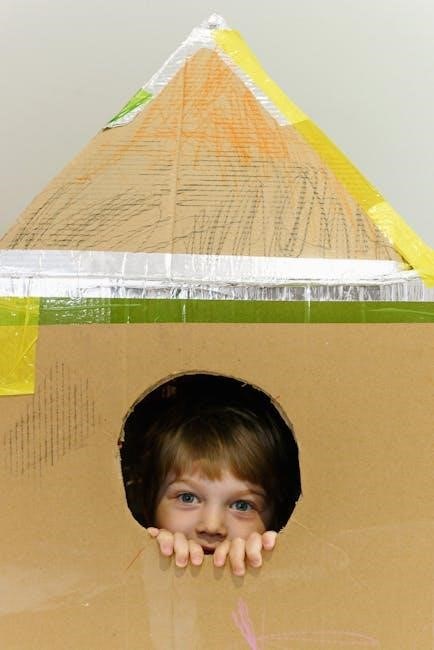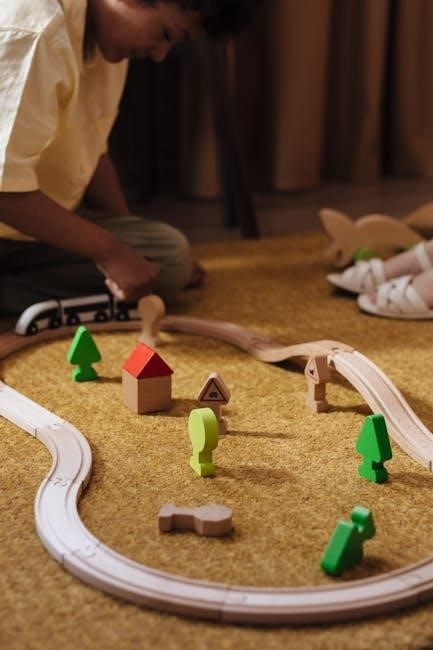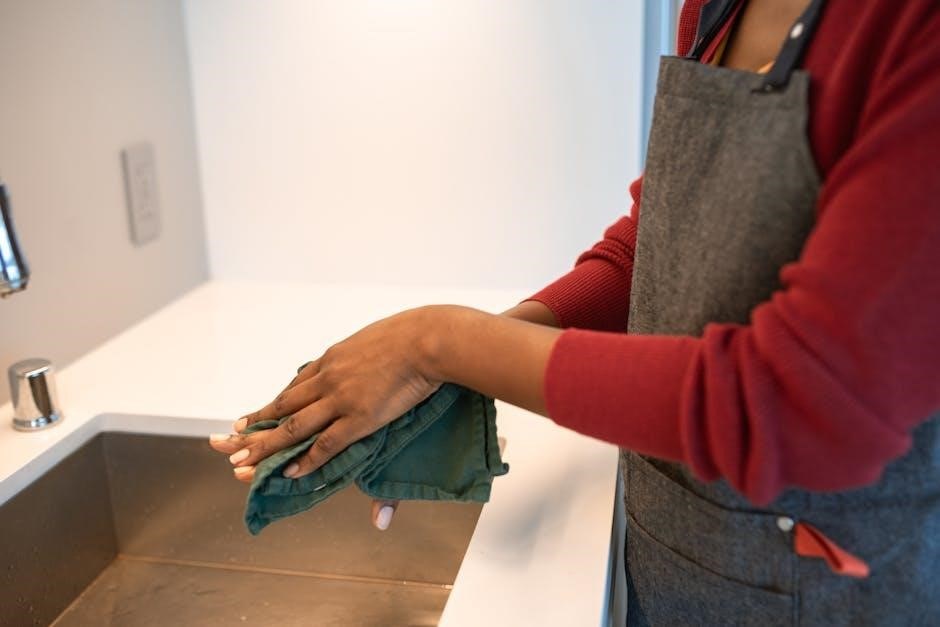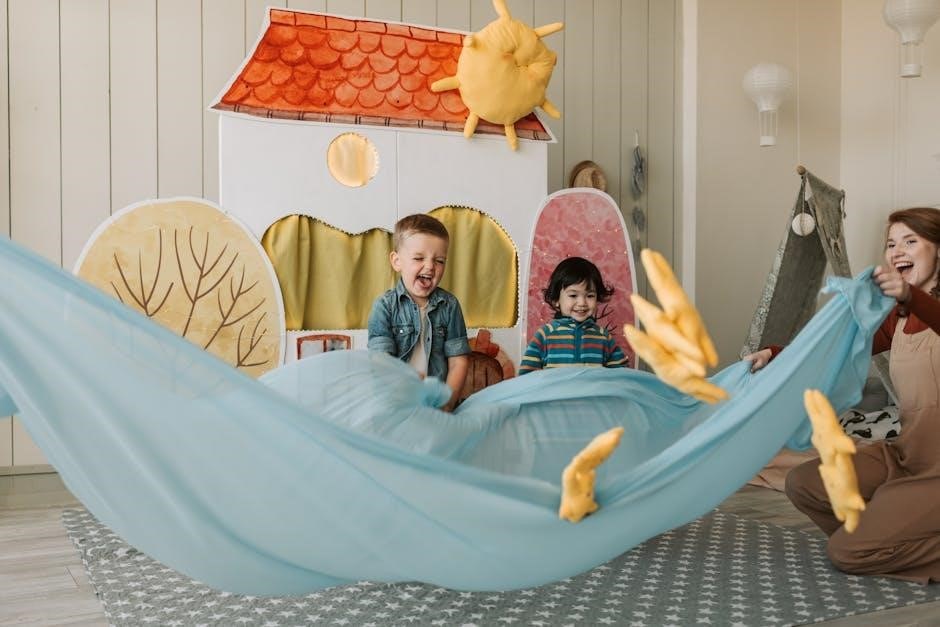Welcome to the House Chores Game Guide! Discover how to transform daily tasks into fun, educational activities. Learn creative ways to engage your family in household responsibilities through playful challenges, fostering teamwork, responsibility, and bonding. This guide offers innovative ideas for all ages, making chores enjoyable and rewarding for everyone.
1.1 Definition of House Chores Games
House Chores Games are interactive activities designed to make household tasks engaging and enjoyable. These games transform mundane chores into fun, competitive, or collaborative experiences, often involving rewards or challenges. Examples include speed cleaning races, treasure hunts, or educational tasks that teach responsibility while keeping participants entertained. By incorporating elements of play, these games aim to motivate individuals, especially children, to contribute to household maintenance willingly. They foster teamwork, accountability, and a sense of accomplishment, turning chores into bonding opportunities for families or roommates. These games are versatile, catering to diverse ages and preferences, making them a practical tool for fostering a positive attitude toward household responsibilities.
1.2 Importance of Engaging in Household Chores
Engaging in household chores is essential for maintaining a clean and organized living environment. It promotes a sense of responsibility and accountability among family members. By contributing to daily tasks, individuals develop life skills such as time management and teamwork. Chores also foster a sense of accomplishment and pride in one’s space. Moreover, sharing responsibilities can strengthen family bonds and reduce the workload on individuals. Teaching children to participate in chores prepares them for independence and future challenges, making it a valuable part of their upbringing and personal growth.
1.3 Benefits of Turning Chores into Games
Turning chores into games transforms tedious tasks into enjoyable activities, increasing motivation and participation. It fosters a sense of competition and teamwork, making household responsibilities more engaging. By incorporating elements of play, chores become less daunting, especially for children, teaching them responsibility in a fun way. This approach also promotes bonding among family members and creates lasting memories. Games like speed cleaning or treasure hunts add excitement, making chores a positive experience that encourages accountability and cooperation while keeping the home tidy and organized.

The Role of Games in Making Chores Enjoyable
Games add fun and excitement to household tasks, turning them into engaging activities. They boost participation, teamwork, and responsibility, making chores less tedious and more enjoyable for everyone.
2.1 How Games Increase Motivation
Games significantly boost motivation by adding excitement and purpose to chores. They introduce elements like competition, rewards, and fun, transforming tasks into enjoyable challenges. Setting clear goals and deadlines encourages individuals to complete tasks efficiently. The sense of achievement from winning or earning rewards fosters a positive mindset. Interactive activities also promote collaboration, making chores feel less like work and more like team efforts. This approach not only enhances productivity but also cultivates a sense of fulfillment, turning routine tasks into engaging experiences that everyone looks forward to accomplishing.
2.2 Enhancing Responsibility Through Play
Playful approaches to chores nurture responsibility by making tasks feel manageable and enjoyable. Assigning age-specific duties ensures each family member contributes meaningfully. Games like “Beat the Clock” or “Chore Bingo” create a sense of accountability, as individuals strive to complete tasks efficiently. Positive reinforcement, such as praise or small rewards, encourages consistency. By framing responsibilities as part of a game, children learn the value of teamwork and the importance of their role within the household, fostering a sense of duty and ownership over their contributions.
2.3 Encouraging Teamwork and Family Bonding
Household chores games are an excellent way to foster teamwork and strengthen family bonds. By transforming tasks into collaborative activities, family members work together toward common goals. Games like “Chore Scavenger Hunts” or “Team Clean-Up Challenges” encourage communication and cooperation. Sharing responsibilities creates a sense of unity and mutual support. This approach not only makes chores more enjoyable but also helps build lasting connections. Celebrating successes together reinforces the value of teamwork, turning routine tasks into opportunities for bonding and creating positive memories.

Types of House Chores Games
Explore various types of house chores games, such as speed cleaning challenges, treasure hunt clean-ups, educational tasks, and outdoor activities, making chores engaging and fun for everyone.
3.1 Speed Cleaning Challenges
Speed cleaning challenges are a fun and effective way to make chores exciting. Set a timer and race against the clock to complete tasks like tidying rooms or washing dishes. This method creates a sense of urgency and turns chores into a competitive game. Families can divide into teams or compete individually, fostering teamwork and healthy rivalry. Rewards for the fastest times add motivation. These challenges not only make cleaning efficient but also teach time management and responsibility. They are ideal for busy households looking to maintain order while keeping the process enjoyable for all members.
3.2 Treasure Hunt Cleaning Games
Treasure hunt cleaning games turn chores into an adventurous experience. Hide small toys, treats, or notes with fun tasks around the house. Create a list of items for children to find while tidying up, such as “a missing sock” or “a dusty book.” This game makes cleaning exciting and engaging, encouraging kids to explore and organize different areas. The thrill of discovery keeps them motivated and teaches them to associate cleaning with fun. It’s a creative way to foster responsibility and teamwork while maintaining a tidy home.
3.3 Educational Chore Games
Educational chore games combine learning with household tasks, making them engaging for children. Activities like matching games, where kids link chores with their names or pictures, enhance vocabulary. Problem-solving tasks, such as sorting laundry or sequencing cleaning steps, boost critical thinking. These games cater to different learning styles, teaching responsibility and life skills. By integrating education into chores, children gain knowledge while contributing to the household, making the experience both productive and enjoyable. This approach fosters a love for learning and prepares them for future responsibilities.
3.4 Outdoor Chore Games
Outdoor chore games bring excitement to yard work and gardening. Activities like a yard scavenger hunt, where kids find and collect items like leaves or sticks, make chores fun. Racing to rake leaves or water plants adds a competitive edge. Incorporating nature-themed challenges, such as planting flowers or weeding, teaches environmental responsibility. These games foster teamwork and a connection to nature while keeping outdoor spaces tidy. By turning outdoor chores into adventures, families can enjoy quality time together and create lasting memories. Outdoor chore games are a refreshing way to maintain your yard while engaging everyone in the process.

Strategies to Make Chores Engaging
Strategies to Make Chores Engaging: Use rewards, music, and friendly competition to motivate and bond. Transform tasks into enjoyable experiences that foster teamwork and responsibility.
4.1 Using Rewards and Incentives
Reward systems can significantly boost motivation. Offer small prizes, stickers, or extra privileges for completed tasks. Create a points-based system where children earn rewards over time. Incentives like screen time, outings, or special activities encourage consistency. Tailor rewards to individual interests to maximize effectiveness. This approach fosters a sense of achievement and makes chores feel worthwhile. Consistent use of rewards helps build lasting habits and a positive attitude toward household responsibilities.
4.2 Incorporating Music and Fun
Transform chores into enjoyable experiences by adding music and playful elements. Play upbeat songs to create a lively atmosphere, turning cleaning into a dance party. Introduce fun challenges, like racing to pick up toys or singing while doing tasks. Incorporate themed days, such as “Superhero Cleaning Day,” to inspire creativity. Allow kids to choose playlists, giving them a sense of control. These strategies make chores less tedious and more engaging, fostering a positive attitude toward helping out. Music and fun elements create lasting memories and turn routine tasks into family bonding moments.
4.3 Creating a Competitive Environment
Foster excitement by turning chores into friendly competitions. Set timers for speed cleaning races, where family members compete to complete tasks fastest. Create leaderboards to track progress, rewarding points for efficiency and thoroughness; Introduce challenges like “Who can pick up the most toys in 5 minutes?” or “Who can clean their room the fastest?” Offer small rewards for winners, such as extra screen time or a special treat. This competitive edge motivates individuals to take ownership of their tasks, making chores feel like a game while promoting responsibility and teamwork.
Age-Specific Chore Ideas
Engage children of all ages with tailored chores. Toddlers can pick up toys, while older kids manage laundry or dishes. Teens thrive on gamified tasks and rewards, fostering responsibility and life skills through fun, age-appropriate activities.
5.1 Games for Toddlers
Engage toddlers with simple, fun chores tailored to their abilities. Use toy puppets or stuffed animals to create a “cleaning crew” for dusting. Set up sorting games, like matching socks or categorizing toys. Introduce a “treasure hunt” to gather scattered items, turning tidying into an adventure. Incorporate songs or rhymes to make tasks lively. Offer small rewards for completion, fostering a sense of achievement. These activities not only teach responsibility but also enhance motor skills and coordination, making chores a positive, playful experience for young children.
5.2 Activities for Older Children
For older children, chores can be made engaging through competitive and educational tasks. Create a “chore chart” with rewards for consistency. Organize a “treasure hunt” where they find and clean misplaced items. Introduce timed challenges, like racing to finish tasks, fostering a sense of achievement. Educational games, such as sorting recyclables or learning cleaning techniques, can also be effective. Assign roles in “family teams” to promote teamwork. Offer incentives like screen time or fun outings for completed tasks. These activities help develop responsibility and life skills while keeping older children motivated and involved in household duties.
5.3 Engaging Teenagers in Chores
Engaging teenagers in chores requires creativity and incentives. Offer rewards tied to their interests, like extra screen time or later curfews. Involve them in planning chores, allowing them to choose tasks they enjoy. Create a competitive atmosphere with sibling challenges or team-based activities. Highlight the life skills they gain, such as responsibility and time management; Praise their efforts to boost confidence. Teenagers respond well to autonomy, so provide choices while setting clear expectations. This approach fosters independence and a sense of contribution to the household, making chores feel less like a burden and more like a shared responsibility.

Integrating Technology into Chore Games
Technology enhances chore games with interactive apps, virtual challenges, and gamification. Apps track progress, assign tasks, and reward points, making chores engaging and fun for all ages.
6.1 Chore Apps and Gamification
Chore apps and gamification tools turn household tasks into interactive experiences. Apps like Habitica or ChoreMonster allow users to earn points, badges, or rewards for completing chores. These platforms often feature leaderboards, streaks, and customizable tasks, making chores competitive and fun. Gamification elements such as virtual coins or unlockable features motivate individuals to stay consistent. Parents can assign chores, track progress, and reward achievements, fostering accountability and teamwork. These apps not only simplify task management but also make household responsibilities a enjoyable part of daily routines for both kids and adults.
6.2 Interactive Tools and Gadgets
Interactive tools and gadgets bring a modern twist to household chores, making them more engaging and enjoyable. Smart vacuums with built-in games, voice assistants that turn tasks into voice-activated challenges, and interactive chore charts are popular options. Gadgets like wearable devices that track progress or apps with AR features add a tech-savvy element. These tools not only make chores fun but also encourage efficiency and accountability. By integrating technology, families can turn routine tasks into exciting activities that foster teamwork and responsibility while keeping up with the digital age.
6.3 Virtual Chore Challenges
Virtual chore challenges are an innovative way to engage families in household tasks through digital platforms. Apps and websites offer interactive features like points systems, badges, and leaderboards to make chores competitive and fun. Families can participate in timed cleaning challenges or earn rewards for completing tasks. These virtual tools add an element of excitement and accountability, encouraging everyone to contribute. They also provide a sense of accomplishment, fostering responsibility and teamwork. Virtual chore challenges are especially effective for tech-savvy households, turning routine tasks into engaging adventures while promoting a sense of achievement and shared responsibility.

Real-Life Applications of Chore Games
Chore games can be seamlessly integrated into daily routines, weekend tasks, and special events, making household responsibilities more engaging and enjoyable for everyone involved, while fostering teamwork and motivation.
7.1 Daily Routine Integration
Integrating chore games into daily routines can make household tasks more consistent and enjoyable. By turning chores into a race against time or a treasure hunt, kids and adults alike stay motivated. For instance, setting a timer for cleaning up toys or hiding small rewards during tasks adds excitement. These activities not only maintain a tidy home but also foster responsibility and teamwork. Incorporating fun elements like music or rewards enhances engagement, making chores a positive part of daily life. Consistency is key, ensuring that everyone contributes and feels accomplished, creating a habit that benefits the whole family.
7.2 Weekend Chore Activities
Weekend chore activities offer a great opportunity to involve the whole family in larger tasks. Plan a “Family Cleaning Challenge” where everyone works together to tackle bigger projects, like organizing closets or deep cleaning the kitchen. Make it fun by setting a timer or turning it into a competition with small rewards. Outdoor chores, such as gardening or yard work, can also be transformed into games, like a race to collect leaves or a scavenger hunt for weeds. These activities not only keep your home tidy but also create lasting memories and a sense of accomplishment for everyone involved.
7.3 Special Event Clean-Ups
Special event clean-ups, like pre-party preparations or post-gathering tidying, can be turned into engaging games. Create a “Pre-Party Sprint” where everyone races to clean up before guests arrive. Assign tasks like “Toy Tornado” for kids to pick up toys quickly or “Dusting Dash” for older children. For adults, organize a “SparklingKitchen Challenge” to make the space shine. After the event, a “Post-Party Puzzle” can involve sorting items into their rightful places. These activities make cleaning fun and ensure your home remains spotless during celebrations. Involving everyone fosters teamwork and a sense of accomplishment, turning chores into memorable experiences.

Impact of Chore Games on Family Dynamics
Chore games foster responsibility, strengthen family bonds, and promote life skills. They create a sense of teamwork, reducing conflicts and encouraging cooperation, while making household tasks enjoyable for all.
8.1 Fostering Responsibility
Chore games are an effective way to instill responsibility in family members, especially children. By transforming tasks into engaging activities, individuals develop a sense of ownership and accountability. Games like speed cleaning or treasure hunts make chores enjoyable while teaching the importance of contributing to the household. Age-specific tasks ensure everyone participates according to their abilities, fostering a sense of duty. Rewards and incentives further motivate consistent effort, creating a culture of shared responsibility and teamwork. Over time, these habits translate into lifelong skills, preparing individuals for independent living and collective family success.
8.2 Strengthening Family Bonds
Engaging in household chore games fosters meaningful connections among family members. By working together toward common goals, individuals build trust and cooperation. Activities like treasure hunts or speed cleaning encourage teamwork, creating shared memories and laughter. These games provide opportunities for open communication and mutual support, strengthening emotional bonds. Involving all ages ensures everyone feels valued, promoting a sense of unity. Turning chores into playful experiences transforms routine tasks into moments of togetherness, enhancing family relationships and creating lasting memories. This collaborative approach makes household responsibilities a positive shared experience.
8.3 Promoting Life Skills
Household chore games are an effective way to instill essential life skills in individuals, especially children. By participating in structured activities, kids learn responsibility, accountability, and the value of contributing to a shared goal. These games also teach time management, problem-solving, and teamwork, which are crucial for personal growth. As children progress, they develop confidence and independence, preparing them for future challenges. Chore games create a foundation for lifelong skills, helping individuals become self-sufficient and capable of managing daily tasks effectively. This hands-on approach makes learning practical and enjoyable, shaping well-rounded individuals.

User Testimonials and Expert Opinions
Parents and experts praise household chore games for fostering responsibility and teamwork. Many share success stories of increased participation and joy in maintaining a tidy home, highlighting their effectiveness in shaping positive habits and collaboration among family members.
9.1 Parent Testimonials
Parents worldwide have embraced household chore games, sharing heartfelt testimonials about their effectiveness. Many report that turning chores into games has significantly increased their children’s willingness to participate. One parent noted, “My kids now race to finish tasks, turning what was once a struggle into a fun family competition.” Another shared, “The scavenger hunt idea transformed cleaning into an adventure—my children now see chores as a game, not a burden.” These testimonials highlight the positive impact of gamifying chores on family dynamics and responsibility.
9.2 Expert Insights on Chore Games
Experts emphasize the psychological and developmental benefits of chore games, noting their role in fostering responsibility and life skills. Child development specialists highlight that these games encourage intrinsic motivation, teaching children the value of contributing to a shared goal. Educators suggest integrating educational elements, such as vocabulary or math, to enhance learning. Behavioral psychologists point to the role of rewards and competition in boosting engagement. Overall, experts agree that chore games are a powerful tool for raising capable, cooperative, and resilient individuals, making them a valuable addition to any household.

Cultural Perspectives on Chore Games
Cultural approaches to household chores vary globally, with some emphasizing collective responsibility and others focusing on individual tasks. Chore games reflect these differences, adapting to local values and traditions, fostering unity and cooperation across diverse backgrounds.
10.1 Global Approaches to Household Chores
Household chores are viewed differently across cultures, with some societies emphasizing communal effort while others prioritize individual responsibility. In many Asian cultures, family members collectively manage chores, fostering teamwork from a young age. In contrast, Western households often assign tasks based on personal preferences or capabilities. Chore games are adapted to fit these cultural norms, making them more engaging and relevant. For instance, in Scandinavian countries, chores are seen as a way to teach life skills, while in some African communities, they are integrated into daily rituals. These global approaches highlight the diversity in how households manage tasks, reflecting broader societal values.
10.2 Cultural Variations in Chore Games
Cultural variations in chore games reflect diverse traditions and values worldwide. In Japan, chores are often turned into meditative practices, emphasizing mindfulness. Scandinavian countries use educational games to teach sustainability. In India, chores are integrated into festivals, making them communal celebrations. Latin American families often incorporate music and dance, turning tasks into lively events. These variations highlight how cultural norms shape the way chores are gamified, making them meaningful and engaging within specific contexts. Such adaptations ensure that chore games resonate with local customs, fostering participation and joy in household responsibilities across different cultures.
Community and Group Chore Initiatives
Community and group chore initiatives foster collective responsibility and teamwork. Neighborhood clean-up events and school programs encourage collaboration, transforming chores into bonding experiences that benefit everyone involved.
11.1 Neighborhood Clean-Up Events
Neighborhood clean-up events turn community chores into engaging group activities. Residents collaborate to tidy public spaces, fostering teamwork and pride. Games like timed clean-up challenges or scavenger hunts for trash make these events fun. Incentives such as rewards or praise motivate participation. These initiatives not only beautify areas but also strengthen community bonds. By involving all ages, they promote environmental awareness and responsibility. Such events demonstrate how collective efforts can transform chores into meaningful, enjoyable experiences that benefit everyone and create lasting positive change in the neighborhood.
11.2 School and Community Programs
Schools and community programs increasingly adopt interactive chore-based activities to educate and engage students. These initiatives often include clean-up drives, recycling challenges, and teamwork tasks that teach responsibility. By integrating fun elements like rewards and competitions, these programs encourage participation and foster a sense of accomplishment. They also promote environmental awareness and civic responsibility, preparing students for real-world challenges. Community partnerships further enhance these efforts, creating a collaborative environment where learning and service go hand in hand. Such programs serve as a bridge between education and practical life skills, benefiting both individuals and society.

Future Trends in Chore Gaming
Future trends in chore gaming include AI-powered tools that adapt tasks to skill levels and preferences, enhancing engagement. Virtual reality may transform chores into immersive adventures, making them more exciting for all ages.
12.1 Emerging Trends
Emerging trends in chore gaming highlight innovative ways to make household tasks engaging. AI-powered apps now personalize chores based on age and skill, while gamification platforms offer rewards for consistency. Virtual and augmented reality are being integrated to create immersive cleaning experiences. Collaborative multiplayer modes encourage teamwork, turning chores into family bonding activities. Additionally, eco-friendly challenges and sustainability-focused games are gaining popularity, teaching kids environmental responsibility. These trends not only make chores fun but also prepare children for a tech-driven future while fostering a sense of accomplishment and contribution to the household.
12.2 Innovations in Chore Games
Innovations in chore games are revolutionizing how families approach household tasks. Smart home devices now integrate with chore apps, enabling voice commands and automated task tracking. Interactive gadgets, like wearable badges that track progress, add a high-tech element to cleaning. Virtual reality (VR) games simulate real-world cleaning scenarios, making chores immersive and exciting. Additionally, augmented reality (AR) apps transform homes into interactive game boards, turning tasks into adventures. These innovations not only make chores more engaging but also teach kids valuable tech skills, blending fun with practical learning.
Transforming chores into games fosters responsibility, teamwork, and fun, creating lasting family bonds. Embrace these innovative ideas to make household tasks enjoyable and rewarding for everyone!
13.1 Summary of the Guide
This guide explored creative strategies to turn household chores into engaging games, fostering responsibility, teamwork, and family bonding. By incorporating elements like speed challenges, treasure hunts, and educational activities, chores become enjoyable for all ages. The importance of motivation, rewards, and technology was highlighted to enhance participation. Age-specific ideas and real-life applications demonstrated practical ways to integrate fun into daily routines. Ultimately, this guide provides a comprehensive approach to making household tasks rewarding and enjoyable, promoting life skills and unity within families.
13.2 Encouragement to Implement Chore Games
Implementing chore games is a simple yet powerful way to create a positive, collaborative environment at home. By turning tasks into fun activities, families can foster responsibility, teamwork, and bonding while making chores enjoyable. These games not only teach essential life skills but also help children develop a sense of accomplishment. Start small, stay consistent, and watch how your household transforms into a place where everyone contributes happily. Encourage creativity and adapt games to suit your family’s needs—soon, chores will become a source of joy and shared success!